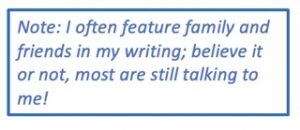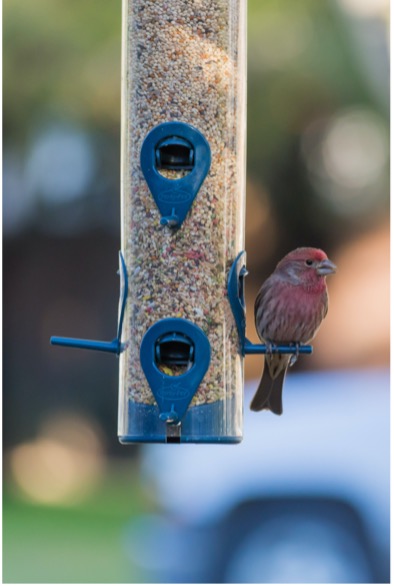Chaparral Complex
The summer sun bore down on my shoulders as we left the main channel and entered our cove. As we approach our dock slowly, I can feel the sweat running down my back; I dread what comes next. “Turn here!” he shouts over the sound of the motor. “Why? I asked myself. I seize the steering wheel of our Chaparral ski boat and slowly turn the 24-foot vessel in an arc. “Now, angle the boat at 45 degrees. Point the bow at the third column on the dock,” he commands.
“Why are we doing this?” I say to myself. The instruction made no sense; I would drift into the dock cock-eyed, I reasoned.
I tense as I recall when we had to take our boat out of the lake at a public landing. My husband, Reed, would back the trailer into the water with our large SUV. My role was to load the boat on the trailer. The wind is brisk, and aligning the bow is tricky. Reed directs me to power the boat onto the trailer. That throttle lever is “sticky,” it doesn’t move, so I push harder, making the engine rev too high, and the boat bolts onto the trailer, barely missing my husband and stopping inches from the back window of the SUV. Afterward, we looked at one another in shock, yet somehow, I positioned the boat precisely where it was needed to secure it to the trailer.
The painful memory of nearly maiming my husband and destroying the boat and SUV sears my mind as I try to navigate the worrisome watercraft into the narrow slip. The pressure builds as I imagine crashing our sizeable investment into the equally expensive dock. I aim the bow at the column, with Reed correcting me as we get closer. “Slow to idle,” he states. “The bow is too far to the left,” correcting me. Still trying to understand why we are approaching at this angle, I overcorrect my steering, and the boat veers too far to the right.
“Stop!” he comments. “We won’t make it.” My mate continues, “Back-up, turn around. Let’s try this again.”
Now my third attempt at docking the boat. I am hot, sweaty, and annoyed. I complain, “Why are you telling me to approach from an angle?” My husband of seven years (at the time) and I rarely argue. After several years of widowhood and single parenting, I met Reed, and we quickly fell for one another. We have always enjoyed a healthy and supportive relationship. Nonetheless, today, we were both exasperated with one another.
The Navy guy, as I call him, has over 40 years of experience as a pilot. He has literally trained hundreds of pilots. However, working with me was infuriating! He comments, “Listen, I instruct all kinds of pilots, men, women, and with different personalities; why can’t I teach my wife?”
I respond defensively, “That’s flying, not steering a boat!”
He takes a deep breath and says, “Look, I don’t know how to explain why I know how to steer this boat; I just know what works.” His calm persona helps me lower my guard and admit, “I am so mad that I can’t get this right!”
He then explains, from his years of flying, navigating air currents in all kinds of weather is like the water currents that impact guiding the Chaparral to the dock. “You must account for that force working against you when steering the boat; that’s why we approach the dock at 45 degrees.
His statement makes sense, though I realize that, unlike Reed, I have no previous life experience or frame of reference to fall back upon to learn to wrangle a boat in a current. Reed would be my best teacher, so I needed to listen. We regroup, I relax, and after another two tries, I successfully guide the boat straight into the dock where it will rest.
However, the failure stays in my mind; as summer progresses, I rarely choose to dock our boat. Filling it with gas at the local marina is entirely out of the question. There the stakes are even higher. The other watercraft are of many sizes, filled with people and often one or two dogs. There are those jet skis with one or two passengers. I wouldn’t want to hit them. In those instances, I freeze in fear; I don’t want to fail in front of so many witnesses. Yet it frustrates me that I cannot put aside my phobia and move through the discomfort of learning, especially in the public eye.
Tenacious Tina
Those immobilizing emotions do not hold back my friend Tina. No, she commands her pontoon boat without hesitation. Once, she and I went out to explore the lake. We stopped at the marina to get some gas. She stealthily steered her party barge parking perfectly adjacent to the dock. As we fill the craft with gas, other boats, and jet skis begin to arrive. I’m getting tense, but Tina is unfazed. She pays in cash so that she can get a discount.
Next, she expertly turns her 23-foot boat to the right avoiding another dock and all the sunbaked boaters. During this complex maneuver, she gets a call on her cell, answers, and converses with her son while navigating the dangers surrounding us with her remaining hand. Tina has grit, and at that moment, I want to be her – though I bet she is shaking her head in disbelief and laughing out loud when she reads this!
Coffee Needs a Canister
Recently my daughter, Gwenyth, and my son-in-law, Leo, gave us something we really needed – a metal coffee canister. It is specifically designed with a tiny filter in the lid secured by a clasp. The filter is changed frequently to ensure the coffee beans maintain flavor. These coffee aficionados know that keeping the beans fresh makes for the most delicious cup of morning joe. I never knew that  how I store the beans directly impacts the taste of my morning ritual beverage. Like approaching a dock at 45 degrees, I had no frame of reference for coffee preservation. As Gwenyth and Leo are java lovers and experts, I trust their judgment and use the canister as directed.
how I store the beans directly impacts the taste of my morning ritual beverage. Like approaching a dock at 45 degrees, I had no frame of reference for coffee preservation. As Gwenyth and Leo are java lovers and experts, I trust their judgment and use the canister as directed.
Carolina Cardinals and Crap
Another friend, Doris, sent me a peculiar gift for Christmas. A huge bag of bird seed and a bird-feeding troll “face.” The eyes and mouth are separate pieces forming the ogre’s face and are drilled into a tree. Next, birdseed is placed in the creature’s mouth for our feathered friends to discover. Doris knew our grandkids would get a kick out of filling the troll’s mouth and watching the birds feeding on the seed. Her thoughtful gift led me to purchase a birdfeeder that we attached to our upper deck railing. From my kitchen window with my heavenly java in a mug, I look out the window and watch as Carolina Cardinals, Chickadees, Mountain Finches, House Sparrows, and the occasional Tufted Titmouse dart away when bossy Blue Jays swoop in for breakfast. I stand transfixed by the vibrant ruby red of the Northern Cardinal couple and the yellow belly of the squatty Carolina Wren. Some days, I see two Mourning Doves eating to their heart’s content. Every day the view is different but compelling, so much so that Reed and I took our birding watching one step further by adding a camera to observe our flock even when we are traveling.
Though my grown children joke that I am a bit obsessed with my new hobby, several studies show that “birding” has several health benefits, including:
- Encouraging mindfulness by getting us to focus entirely on the present
- Reducing stress and anxiety by observing nature and listening to their bird songs
- Sharpening memory and cognitive skills as the “birder” identifies and recalls various species
- Producing laughter. Watching birds and their eating, mating, and other antics is surprising and entertaining.[1] Laughter, as we all know, is the best medicine.
As the birds of a feather have flocked to my back deck, I must refill the feeder every 5-6 days. Lugging the 20-pound bag of seeds to the back porch, I realize the truth of the saying, “what goes in must also come out.” I notice bird droppings covering parts of the railing and porch and some on the table. After I spent 30 minutes cleaning up after my feathered friends, I seriously considered cutting off their supply of seeds and nuts. But I don’t; I admit, I’m a “birder” now.
Lessons from Chaparral, Coffee, and Cardinals
I share these three seemingly unrelated and disparate stories to show how often new situations that can overwhelm, anger, and discourage us or, alternatively, educate, calm, and even delight us.
While driving the Chaparral, I replayed my previous failure and imagined the worst-case scenario. Negative thinking kept me from listening to the more experienced “Navy guy.” I want life to be simple. Give me a boat with a steering wheel, and I should be able to figure out how to get it from point A to point B. It is most challenging to learn a new skill entirely foreign to us. We need a frame of reference. On those occasions, we must give ourselves the time and grace to learn a new skill, ask for help, and listen to those assisting.
I should know that coffee has a shelf-life and needs to be stored properly. Yet the canister isn’t a coffee “urn” where the contents go to die. The canister preserves the bean’s flavor; it isn’t there to keep me from brewing those beans. Staying on the sidelines and not learning how to dock the boat is a lot like choosing to keep coffee in an urn. Instead, I must break out of my insecurity and keep developing my capability. I may need to channel Tina the Tenacious to tackle my Chaparral Complex, but I will if I keep trying.
I should expect my back porch birds to defecate yet devise a more efficient means to clean up after them. I will choose to enjoy the birds’ beauty and carefree antics. And in this way, those birds keep me smiling and looking up.
I get agitated and frustrated when I don’t get a new skill the first time. Yet, I have teachers everywhere. I need to relax, breathe, ask questions, and accept that learning is about failing until I figure things out. Acquiring new skills takes practice, and I may not get it the first or fifth time. I will only improve if I don’t give up. Our Chaparral will be in the water in less than a month. It will be time for me to work through the discomfort. Before I jump into that boat, though, I’ll take the coffee out of the canister, brew some beans, and sit and enjoy watching those birds.
[1] Holbrook. C. (n.d.). Beautiful birding: 7 mental health benefits of bird watching. Retrieved March 10, 2023, from https://www.happiness.com/magazine/art-culture-leisure/mental-health-benefits-of-bird-watching




Reed shoulda fully disclosed that he was an LSO.